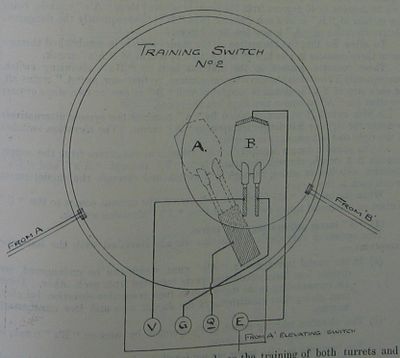Difference between revisions of "Kilroy Danger Signal"
From The Dreadnought Project
m |
|||
| Line 3: | Line 3: | ||
It was one of several contributions of [[Willie Dickson Kilroy]], an inventor and officer in the [[Royal Navy Volunteer Reserve]]. | It was one of several contributions of [[Willie Dickson Kilroy]], an inventor and officer in the [[Royal Navy Volunteer Reserve]]. | ||
| + | |||
| + | When the system detected an unsafe firing condition, a loud audible alarm from a warning trumpet would sound in the endangering turret, and it was to be taken to mean, "Don't fire!" A visual indication would accompany the sound. | ||
| + | <ref>''handbook for Fire Control Instruments, 1914'', p. 53.</ref> | ||
==See Also== | ==See Also== | ||
| Line 13: | Line 16: | ||
==Bibliography== | ==Bibliography== | ||
{{refbegin}} | {{refbegin}} | ||
| + | *{{BibHandbookFireControlInstruments1914}} | ||
{{refend}} | {{refend}} | ||
[[Category:FireControl]] | [[Category:FireControl]] | ||
[[Category:ShipboardEquipment]] | [[Category:ShipboardEquipment]] | ||
Revision as of 16:13, 28 February 2011
Kilroy's Danger Signal was an automated system to detect and signal when the blast from one turret's guns might endanger the guns of another turret based on their present training and elevation angles.
It was one of several contributions of Willie Dickson Kilroy, an inventor and officer in the Royal Navy Volunteer Reserve.
When the system detected an unsafe firing condition, a loud audible alarm from a warning trumpet would sound in the endangering turret, and it was to be taken to mean, "Don't fire!" A visual indication would accompany the sound. [2]
See Also
Footnotes
- ↑ Annual Report of the Torpedo School, 1913, p. 103.
- ↑ handbook for Fire Control Instruments, 1914, p. 53.
Bibliography
